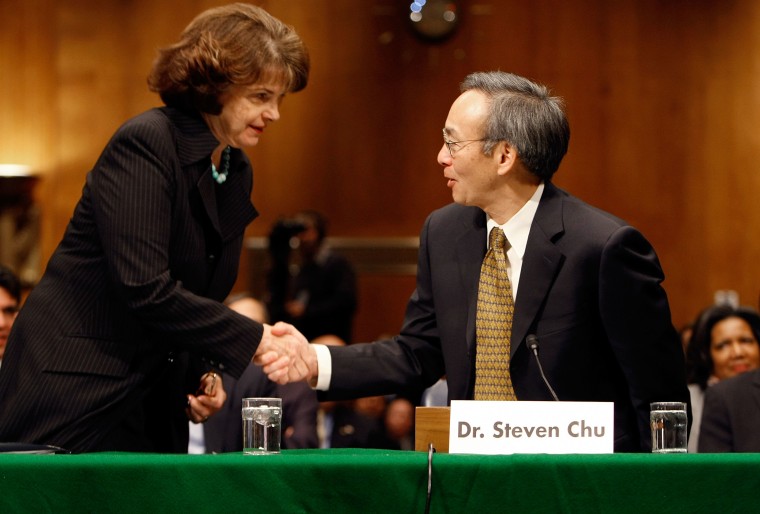Nobel Prize-winning physicist Steven Chu promised Tuesday that if confirmed as energy secretary he will aggressively pursue policies aimed at addressing climate change and achieving greater energy independence by developing clean energy sources.
But he also told lawmakers that he views nuclear power and coal as critical parts of the nation's energy mix and said he was optimistic that ways can be found to make coal a cleaner energy source by capturing its carbon dioxide emissions.
Nominated by President-elect Barack Obama to head the Energy Department, Chu appeared before the Senate Energy and Natural Resources Committee where he received immediate support from both Democrats and Republicans.
Committee chairman, Sen. Jeff Bingaman, D-N.M., said Chu has "the insight and vision" to press Obama's energy policies. Bingaman said he saw no serious opposition to Chu's nomination and that a committee vote approving his selection would likely occur later this week.
Chu, a Chinese-American who has been director of the Lawrence Berkeley National Laboratory since 2004, told senators that climate change is "a growing and pressing problem" and the nation's dependence on oil represents a threat to the U.S. economy and security.
Of the risks from global warming, Chu said: "It is now clear that if we continue on our current path, we run the risk of dramatic disruptive changes to our climate system in the lifetimes of our children and grandchildren."
But senators wanted to know how he might bring China into a global agreement on climate change.
The United States and China are "in a standoff" over taking initial steps to reduce greenhouse gases, Chu said, and the United States should "take the first step and China closely follows."
"If China doesn't follow we'll have to re-look at it," he added.
Simply trusting China? asked Sen. Evan Bayh, D-Ind. "That approach will not be enacted by the United States Congress."
Sen. Lisa Murkowski of Alaska, the committee's ranking Republican, also called Chu well qualified, but pressed him on his position on offshore oil development and nuclear energy.
Chu said nuclear energy produces a fifth of the nation's electricity and 70 percent of the carbon-free electricity and "is going to be an important part of our energy mix." About domestic oil production, Chu reiterated Obama's views that some expansion of offshore oil and gas development should be included as part of a broader energy plan.
But Chu sidestepped Murkowski's question on whether he would oppose any reinstatement of a broad ban on offshore oil drilling on the Atlantic and Pacific coasts. "Improvements in energy efficiency is the one single factor that can most reduce our dependency on foreign oil," said Chu.
A widely respected scientist who shared a Nobel Prize in physics in 1997, Chu has been a strong advocate for more energy-related research, especially work on advanced biofuels and solar energy technologies.
Sen. Blanche Lincoln, D-Ark., asked Chu about early research into using plants to produce not ethanol, but direct substitutes for gasoline or diesel.
"Now we're getting into the science. I love this," replied Chu, 60, before going into a detailed explanation of the challenges in such research and progress being made.
Chu's passion about developing new types of nonfossil energy and his concerns about climate change have been well documented.
But when pressed by senators, Chu acknowledged that coal cannot be abandoned as a primary source of energy, although he promised that research into capturing carbon emissions — pollution linked to climate change — would be pursued aggressively.
"Some people think perhaps we can turn off coal," said Chu. "Even if we do it, China and India will not."
Chu shared the Nobel Prize for physics in 1997 for finding a way to cool and trap atoms by using laser light. He is a former chairman of the physics department at Stanford University, and before that was head of the electronics research laboratory at Bell Labs.
